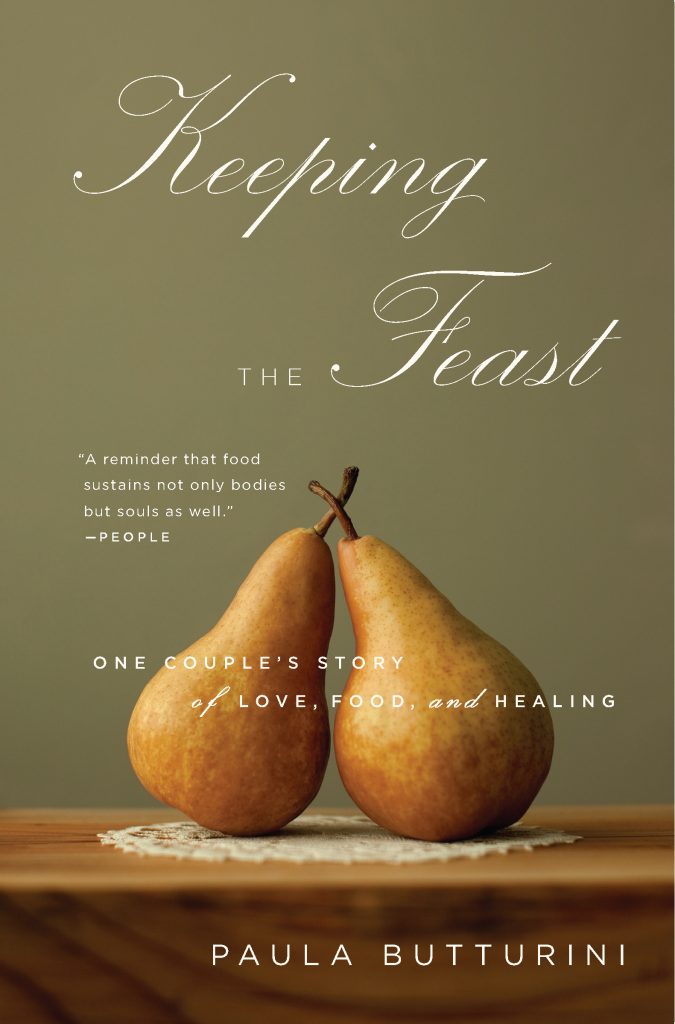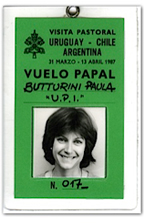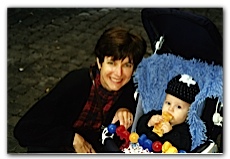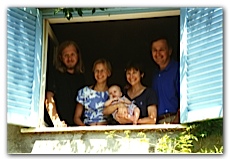Keeping the Feast
 Buy the Book:
Buy the Book:Amazon
Barnes & Noble
IndieBound
Published by: Riverhead
Release Date: February 18, 2010
ISBN13: 978-1594488979
Synopsis
Keeping the Feast traces the path of a single bullet that upended the lives of an American couple reporting on the fall of Communism in 1989. Ultimately, though, it is a memoir that celebrates the healing to be found in the sharing of food, three times a day, among friends and family in Italy and France.
A story of food and love, injury and healing, Keeping the Feast is a memoir of nourishment and restoration in Italy after a long period of tragedy, and a contemplation of the extraordinary sustaining powers of food, family, friendship, and grace. It’s the story of my family, and what happened to it after a single bullet, fired by a sniper two days before Christmas 1989 in the brief mayhem of Romania’s overthrow of its Communist dictator, nearly killed my husband, John Tagliabue of The New York Times. It’s the story of the reverberations set off by that one bullet up and down the generations of our entire family, and how we fought for nearly twenty years to find the new place in the world to which that bullet sent us all.
 John and I met in Italy, where I too was a foreign correspondent, for the old United Press International. We fell in love, transferred to Warsaw in the waning days of Communism and four years later married in Rome. Twenty-three days after our wedding, John was shot in the back while covering the Romanian uprising against Nicolae Ceausescu. Infection, illness, and a family tragedy followed, and although John eventually recovered from his physical wounds, the process of healing had just begun. Unable to regain his equilibrium after the shooting,
John and I met in Italy, where I too was a foreign correspondent, for the old United Press International. We fell in love, transferred to Warsaw in the waning days of Communism and four years later married in Rome. Twenty-three days after our wedding, John was shot in the back while covering the Romanian uprising against Nicolae Ceausescu. Infection, illness, and a family tragedy followed, and although John eventually recovered from his physical wounds, the process of healing had just begun. Unable to regain his equilibrium after the shooting, John began a long, slow slide into textbook depression, an illness familiar in both our families, who had emigrated from Italy in the late 1800s and early 1900s. John’s illness marked the abrupt end of our old life and the beginning of a new one neither of us had expected. John felt inexplicably safe in Italy during his illness, so we moved back in search of a cure. It was also there that John and I rediscovered the importance of one of the fundamental human rituals: the daily sharing of food around the family table. Keeping the Feast, like memory itself, wanders back and forth between old recollections and new. Food is the thread that connects them, for food has always been my eye on the world.
John began a long, slow slide into textbook depression, an illness familiar in both our families, who had emigrated from Italy in the late 1800s and early 1900s. John’s illness marked the abrupt end of our old life and the beginning of a new one neither of us had expected. John felt inexplicably safe in Italy during his illness, so we moved back in search of a cure. It was also there that John and I rediscovered the importance of one of the fundamental human rituals: the daily sharing of food around the family table. Keeping the Feast, like memory itself, wanders back and forth between old recollections and new. Food is the thread that connects them, for food has always been my eye on the world.
When I began the book, my idea was to write a detailed and accurate account of the shooting and its aftermath so that John’s two older children would know as much as possible about what had happened to their father. Though Peter was fourteen and Anna eight at the time of the shooting, both of us thought they were too young to appreciate the gory horrors of his physical wounds, and the later psychological horrors of major depression. Once I started writing, though, I saw that the story had become bigger than a simple family journal, and soon both John and I understood it might be able to help other families who were suffering from serious physical and psychological injuries related to war and violence.
There was another very personal reason too: I had grown up in the Fifties — when nobody talked about mental illness — and my mother suffered four bouts of major depression before I was eight. But I knew nothing about it until she revealed her illness to me when I was 28. Her revelation explained away most of my childhood mysteries, and I knew my childhood would have been easier had I known my mother was seriously ill.
 I started writing the book about six years after the shooting, and though I accomplished quite a bit, it was a terribly painful experience because it was all still too new and raw. And then, at age 45, I became pregnant for the first time in my life, and wanting to enjoy what was likely to be my only experience of pregnancy, I put the project on hold, thinking I’d get back to it in a year or two after the eventual birth of our daughter.
I started writing the book about six years after the shooting, and though I accomplished quite a bit, it was a terribly painful experience because it was all still too new and raw. And then, at age 45, I became pregnant for the first time in my life, and wanting to enjoy what was likely to be my only experience of pregnancy, I put the project on hold, thinking I’d get back to it in a year or two after the eventual birth of our daughter.
Life, as it has a way of doing, intervened in my plans, and it wasn’t until about a decade later that I resumed writing. It was amazingly easier to write after so much time had passed, partly because of the distance time had given me, partly because I had been writing it in my head throughout those intervening years. Age, too, played a key role — I was thirty-eight when John was shot and am nearing 60 today. I clearly felt a deep need to get all my old, detailed notes into a coherent story for the children before my time ran out. I wanted the children to have our family’s road map through and out of depression. I did not want them to suffer the same conspiracy of silence that I did as a child, and which still surrounds mental illness today.John and I both hope that our experience may help other families realize that depression is not necessarily a life sentence or a death sentence, and that after — or even despite — depression, joy, laughter, and love can reappear, deeper than ever.
resumed writing. It was amazingly easier to write after so much time had passed, partly because of the distance time had given me, partly because I had been writing it in my head throughout those intervening years. Age, too, played a key role — I was thirty-eight when John was shot and am nearing 60 today. I clearly felt a deep need to get all my old, detailed notes into a coherent story for the children before my time ran out. I wanted the children to have our family’s road map through and out of depression. I did not want them to suffer the same conspiracy of silence that I did as a child, and which still surrounds mental illness today.John and I both hope that our experience may help other families realize that depression is not necessarily a life sentence or a death sentence, and that after — or even despite — depression, joy, laughter, and love can reappear, deeper than ever.
Praise
"Written with grace and courage, Paula Butturini's Keeping the Feast is about the endurance of love in the face of overwhelming odds—depression, tragedy, loss. But it is also about the comfort to be found in the dailiness of life, when every humble act becomes an act of faith; when the preparation and sharing of three good meals a day, however simple, is both a reminder and a celebration—an insistence on celebration—of what life offers. Keeping the Feast is a triumph of will and spirit. It made me hungry for everything."
—Abigail Thomas, author of the best-selling memoir A Three Dog Life
"Keeping the Feast is a remarkable story, gorgeously told. We reflect, relish, grieve, and heal our way with Paula Butturini through two decades in which her life intersected with a drama of history and the human condition. She is wise about so many things—place and family; depression, religion, and love; the immediate restorative pleasures of a single Italian meal. This book evokes life at its most serious and dire, and at its most mysterious and delectable. Read it, and be deepened and refreshed."
—Krista Tippett of NPR’s Speaking of Faith
"If food is love and love heals, does that mean food heals? Paula Butturini proves the equation in gorgeous yet unadorned prose. I will never, ever forget this book."
—Patricia Volk, author of STUFFED and To My Dearest Friends